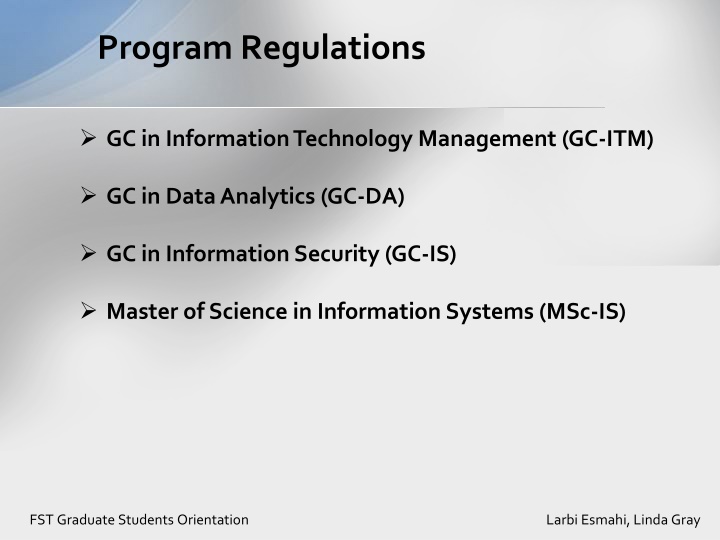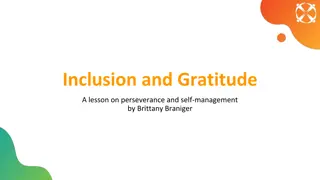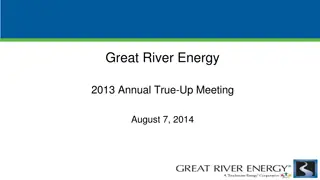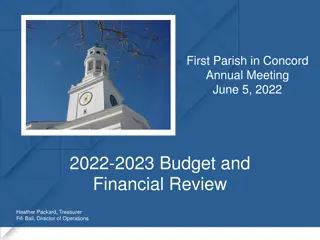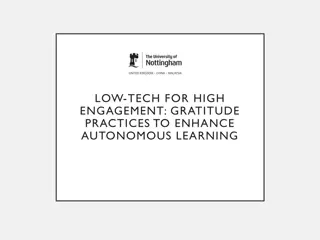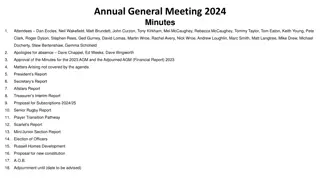Annual Meeting Overview & Gratitude Presentation
The annual meeting features a split format due to COVID-19, recognizing retiring members and expressing gratitude to CEO Jane Christyson and delegates. The General Assembly is divided into two parts for voting and non-voting members, with reports from various committees, including the Board of Directors and Operations Report. The meeting acknowledges outgoing board members and highlights the dedication of team members. Join us in this virtual event to stay informed and engaged with the organization's activities.
Download Presentation

Please find below an Image/Link to download the presentation.
The content on the website is provided AS IS for your information and personal use only. It may not be sold, licensed, or shared on other websites without obtaining consent from the author.If you encounter any issues during the download, it is possible that the publisher has removed the file from their server.
You are allowed to download the files provided on this website for personal or commercial use, subject to the condition that they are used lawfully. All files are the property of their respective owners.
The content on the website is provided AS IS for your information and personal use only. It may not be sold, licensed, or shared on other websites without obtaining consent from the author.
E N D
Presentation Transcript
Program Regulations GC in Information Technology Management (GC-ITM) GC in Data Analytics (GC-DA) GC in Information Security (GC-IS) Master of Science in Information Systems (MSc-IS) FST Graduate Students Orientation Larbi Esmahi, Linda Gray
GC in Information Technology Management (GC-ITM) Residency requirements: Six credits through AU Program Status: minimum 6 credits per year Time limit: 2 years Program Extension/ Program Deferral: up to one year. Core courses: (9 credits) COMP505: Operation Management (3) COMP506: Organizational Behavior in Information Systems (3) COMP607: Ethical, Legal, and Social Issues in Information Technology (3) Elective courses: (3 credits) COMP635: Green ICT Strategies (3) COMP605: Project Management for Information Systems (3). COMP638: Enterprise Modeling (3). FST Graduate Students Orientation Larbi Esmahi, Linda Gray
GC in Data Analytics (GC-DA) Residency requirements: Six credits through AU Program Status: minimum 6 credits per year Time limit: 2 years Program Extension/ Program Deferral: up to one year. Core courses: (9 credits) COMP504: Object Structure and Programming (3) COMP682: Data Mining (3) COMP683: Introduction to Learning Analytics & Knowledge (3) Elective courses: (3 credits) COMP602: Enterprise Information Management (3) COMP657: Artificial Intelligence: Principles and Techniques (3) COMP658: Computational Intelligence (3) COMP684: Business Intelligence (3) FST Graduate Students Orientation Larbi Esmahi, Linda Gray
GC in Information Security (GC-IS) Residency requirements: Six credits through AU Program Status: minimum 6 credits per year Time limit: 2 years Program Extension/ Program Deferral: up to one year. Core courses: (9 credits) COMP604: Enterprise Computer Networks (3) COMP607: Ethical, Legal, and Social Issues in Information Technology (3) COMP660: Enterprise Information Security (3) Elective courses: (3 credits) COMP656: Cloud Computing (3) COMP689: Advanced Distributed Systems (3) FST Graduate Students Orientation Larbi Esmahi, Linda Gray
Master of Science in Information Systems (MSc-IS) Residency requirements: 18 credits through AU. Program Status: minimum 6 credits per year. Time limit: 5 years. Program Extension/ Program Deferral: up to one year. Advanced standing: up to 9 credits. Transfer of credits: Grad course with grade > B- and < 7 years old. Laddering a GC into MSc-IS: Courses < 7 years old. Essay Project Thesis Routes Components Min Max Min Max Min Max Foundations 3 12 3 12 3 12 Core 15 15 9 Electives 9 3 3 Integration 3 9 15 Total (MSc IS) 30 39 30 39 30 39 FST Graduate Students Orientation Larbi Esmahi, Linda Gray
Master of Science in Information Systems (MSc-IS) Foundation courses: (3-12 credits) COMP 601: Survey of Computing and Information Systems (3 credits, required). Courses to select from: COMP 501, COMP 503, and COMP 504, COMP 505, COMP 506. Core courses: (9-15 credits) COMP 695: Research Methods in Information Systems (3 credits, required). Courses to select from: COMP 602, COMP 604, COMP 605, COMP 607, COMP 610, COMP 638, COMP 648, COMP 657, COMP 682, COMP 689. Elective courses: (3-9 credits) Any of the core courses and the following: COMP 617, COMP 635, COMP 637, COMP 650, COMP 656, COMP 658, COMP 659, COMP 660, COMP 667, COMP 674, COMP 683, COMP 684, COMP692, COMP693, COMP694. Integration Route: (3-15 credits) Course based Route/ Essay: COMP 696 (3 credits) Project-based Route: COMP 697-699 (9 credits) Thesis-based Route: COMP 676-680 (15 credits) FST Graduate Students Orientation Larbi Esmahi, Linda Gray
MSc IS Route selection Related image After Foundation Courses 5 Cores 1 Electives Project Project Route 5 Cores 3 Electives Essay 3 Cores 1 Elective Thesis Thesis Route Essay Route FST Graduate Students Orientation Larbi Esmahi, Linda Gray
Focus areas for MSc IS Students can complete the MSc IS program without a focus area. A focus area is a subject concentration within the MSc IS program. Focus areas in the MSc IS are: Focus on Information Technology Management. Focus on Information Systems Development. Focus on Data Analytics. Focus on Information Security. Focus on Cloud Computing. Focus on Health Informatics. Focus on Learning Technology. FST Graduate Students Orientation Larbi Esmahi, Linda Gray
Focus areas regulations Focus on Information Technology Management: Students are required to complete or get advanced standing for COMP 505, and complete COMP 605, COMP 607, and one of {COMP 610, COMP 635, COMP 638}. Focus on Information Systems Development: Students are required to complete or get advanced standing for COMP 501, and complete COMP 602, COMP 610, and one of {COMP 605, COMP 607, COMP 638, COMP 648, COMP 689}. Focus on Data Analytics: Students are required to complete or get advanced standing for COMP 504, and complete COMP 682, COMP 683, and one of {COMP 602, COMP 607, COMP 657, COMP 658, COMP 684}. Focus on Information Security: Students are required to complete or get advanced standing for COMP 503, and complete COMP 604, COMP 660, and one of {COMP 607, COMP 656, COMP 689}. Focus on Intelligent Systems: Students are required to complete or get advanced standing for COMP 501, and complete COMP 607, COMP 657, and one of {COMP 658, COMP 667, COMP 682, COMP 683, COMP 684}. Focus on Cloud Computing: Students are required to complete or get advanced standing for COMP 503, and complete COMP 656, COMP 689, and one of {COMP 604, COMP 607, COMP 660}. Focus on Health Informatics: Students are required to complete or get advanced standing for COMP 505, and complete COMP 620, one of {MHST 601, MHST 602}, and one of {COMP 602, COMP 605, COMP 607, COMP 10, COMP 635, COMP 648, COMP 650}. Focus on Learning Technology: Students are required to complete or get advanced standing for COMP 505, and complete COMP 683, MDDE 603, and one of {MDDE 613, COMP 602, COMP 605, COMP 607, COMP 635, COMP 638, COMP 648, COMP 650}. New focus areas and courses Focus on Bioinformatics: COMP 625, BIOL 620, Focus on Environmental Data Analysis: ENVR 620, GEOL 620
Course Regulations Online Group Study: 13-week timetable. Sessions start on September, January, and May. Online Individualized Study: Contract of 6 months. Sessions start the beginning of every month. The following courses are delivered in individual study: COMP 617, COMP 667, and COMP 682. The Essay (COMP 696), Project (COMP 697-699) and Thesis (COMP 676-680) courses are also considered individual study Online Independent Study: COMP 692 and COMP 693. used to teach topic not covered in our regular courses. Seminar course: COMP 694, delivered in a seminar format used for elective credits. All students are welcome to attend the seminars, but those who like to get credits must register and fulfill the assessment requirements. Minimum Grade to pass courses: B- (70%). Course extensions: 2 months only for the following courses: COMP 501, COMP 503, COMP 504, COMP 602, COMP 617, COMP 667, COMP 682, COMP 696 COMP 697-699, COMP 676-680 Course Withdrawal: Early Withdrawal (Within 30 Days of Course Start Date): will not appear on the transcript, Partial Refund. Withdrawal (After 30 Days of the Course Start Date): Grade = W , No Refund. Course Re-registration: one time for failed courses. FST Graduate Students Orientation Larbi Esmahi, Linda Gray
PhD Studies at the University of Oviedo Spain PhD in Computer Science: Each year 2 to 5 MSc IS graduate can join the program. The doctoral program is a 3 5 years . No tuition fees, but student need to pay an application fee (~ US$ 1392) and an enrollment fee (~ 300 Euros/ year) The students are required to be presented onsite for a week to take a mandatory course at the University of Oviedo. This course usually offers in March of every year. Application Requirements: The applicants must be a graduate from the MScIS program in School of Computing and Information Systems, Faculty of Science and Technology, Athabasca University. Applicants from the MScIS program must have: A faculty member from Athabasca University designated as a co-supervisor for their PhD study; A research proposal must be developed jointly with a faculty member of Athabasca University; A letter of consent from the faculty member of Athabasca University; An official transcript from Athabasca University. Contact Person: For this MOU, the Coordinator appointed by Athabasca University is Dr. Ching Tan of the Faculty of Science and Technology: qingt@athabascau.ca FST Graduate Students Orientation Larbi Esmahi, Linda Gray
PhD Studies at the University of Eastern Finland IMPDET PhD studies in Educational Technology. Collaboration between some faculty at SCIS and UEF, so no Guaranteed seats . Lead supervisor can be an SCIS faculty. The doctoral program is a 3 5 years . Application Requirements: The applicants must be a graduate from the MScIS program in School of Computing and Information Systems, Faculty of Science and Technology, Athabasca University. Application process as follow: Prepare and submit required documents to the IMPDET coordinator (including a research plan and information on who would be supervisor from AU); UEF faculty assess the application and decide on the course of the application. Pre-admitted students are assigned co-supervisors from UEF; The student elaborate a final research plan in collaboration with the supervisory committee that includes both AU and UEF supervisors; The student completes the application and submits it the UEF. Contact Person: Dr. Sabine Graff is the coordinator for this collaboration : sabineg@athabascau.ca FST Graduate Students Orientation Larbi Esmahi, Linda Gray
Thank you ! Questions ? Program Advisor: fst_grad_success@athabascau.ca Program Director: larbie@athabascau.ca
